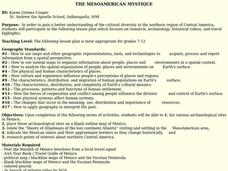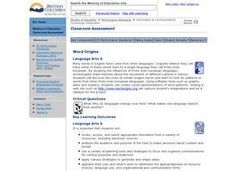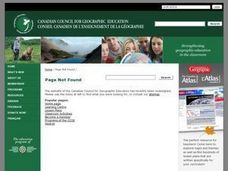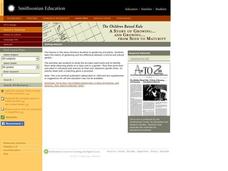Curated OER
Facts, Feats and Folklore: Spiders
Students review and discuss a variety of sayings, folklore and superstitions about spiders. They discuss this information and choose either an interesting fact or appealing foklore tradition to illustrate.
Curated OER
Decomposing Artifacts
Seventh graders participate in an experiment in which they calculate the time of decomposition of different materials. In groups, they fill bags with different materials and cover them in soil. After six months, they create a line graph...
Curated OER
Does This Belong to You?
Fourth graders examine legislation that has been passed to protect the rights and religion of Native Americans. In groups, they discuss their feelings on others taking artifacts from Native American sites and what they do if they find...
Curated OER
What a Site!
Fourth graders are introduced to how to properly create a grid site. In groups, they use Cartesian coordinates to establish the boundaries for the grid and photograph the location of artifacts. They exchange their photos with another...
Curated OER
People of the Past
Young scholars investigate the four groups of people that existed in the U.S. before the European settlers arrived. They predict how the people arrived in the U.S., then investigate their predictions to find out whether or not they are...
Curated OER
Culture Challenge
Students identify and classify characteristics of the four pre-European cultures in Wisconsin. They playing a game about the different characteristics that belong to each of the cultures studied.
Curated OER
Creating a Neighborhood Timeline
Middle schoolers research information about their neighborhoods. Uncovering facts about geology and Native Americans, they examine how the neighborhood has evolved over time. They work together to create a timeline of specific events.
Curated OER
Letters from the Japanese American Internment
Young scholars make deductions about life in an internment camp by reading and comparing letters written to Clara Breed. Along the way, they consider the advantages of looking at a historical event from the multiple points of view of...
Curated OER
It's All In The Rocks
Students think critically to determine fact or inference when examining sedimentary layers with embedded fossils. Geology and evolutionary biology are introduced. They individually write a story about various diagrams and share their...
Curated OER
Understanding Artifacts
Young scholars will develop a greater awareness of the things surrounding them and will be able to build a bridge between their own material culture and that of an imaginary figure from the past. This lesson focuses on the significance...
Curated OER
THE MESOAMERICAN MYSTIQUE
Learners research, archeology, historical videos, and travel highlights in the northern region of Central America. They identify the various archaeological / historical sites along with a date of probable existence and the title of the...
Curated OER
Language Arts- Word Origins
Sixth graders locate, access, and select appropriate information from a variety of resources, including electronic sources. They analyze the audience and purpose of the task to make decisions about content and format.
Curated OER
Teaching About Trade in the Ancient Mediterranean
Sixth graders examine the trade routes in the Mediterranean of the Ancient world. In groups, they view slides of artifacts while answering questions on a worksheet. After watching a video, they discuss how each object was found and...
Curated OER
Ancient Cyprus: The Cesnola Collection at the Semitic Museum, Harvard University
Ninth graders review what they already know about ancient civilizations. Before visiting the museum, they complete a pre-test on Cyprus and how trade is important to the island. During the visit, they travel in small groups to examine...
Curated OER
Rock Art and Ritual
Students explore, examine and determine what kinds of rock art motifs are likely the product of ancient ritual descent. They identify connections between rock art symbolism and Native American ritual practices. Each student also views a...
Curated OER
Why is the Past Important?
Students explore, examine and study why it's important to study the past and connect this importance with reasons why we should learn from the past and how cultures have changed over the years. They bring an object, photograph or a...
Curated OER
Super Scientists Code
In this science learning exercise, students use the key code on the right to unscramble each of the scientists. They also match each of the scientists found to their correct description.
Curated OER
Using Land
In this land usage worksheet, students read about farmers in Bolivia are using a system called raised-bed agriculture to feed its people. Students complete 2 short answer questions based on what they read.
Curated OER
House Keys: The Architectural Features of Victorian Homes and Buildings
Learners analyze Victorian architectural patterns wit regard to materials, doorways, windows, towers, bays, roofs, and decoration. Students discern varying architectural traits by studying Victorian era pictures and drawings and using a...
Curated OER
Baga Drum
Students examine a Baga Drum in order to explore the history of the Baga people of West Africa. In this art history lesson, students recognize figures used in Baga Drum design that represent aspects of Baga culture. They also design and...
Curated OER
Primary History: The Romans - Amphorae
In this Roman history worksheet, students draw in the missing parts of the broken pots that were used during Roman times. Kids read short descriptions for the storage jar, wine jar, and honey pot. Students then decorate the large pot...
Curated OER
Kentucky
For this Kentucky reading comprehension worksheet, students read a 2-page selection regarding the state and they answer 10 true or false questions pertaining to the selection.
Curated OER
Maine
In this Maine reading comprehension worksheet, students read a 2-page selection regarding the state and they answer 10 true or false questions pertaining to the selection.
Curated OER
Study Guide for the 2009 Doris Conant Lecturer on Women and Culture: Barbara Ehrenreich
Students analyze the teachings of Barbara Ehrenreich about women and culture. In this women and culture activity, students define "joy" and "collective joy." Students do field research on these topics and write a field report and a...
Other popular searches
- Archaeology Math
- Archaeology Videos
- Art and Archaeology
- Science Archaeology
- Archaeology Recording Form
- Archaeology Internet
- Archaeology Animal
- Material Culture Archaeology
- Olympic Archaeology
- Music and Archaeology
- Archaeology of the Future
- Archaeology Alaska

























